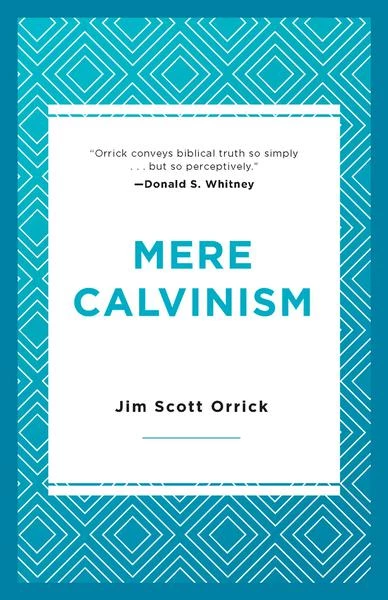
Jim Scott Orrick
Reviewed by: Cornelius Tolsma
Mere Calvinism, by Jim Scott Orrick. P&R, 2019. Paperback, 224 pages, $11.50. Reviewed by OP minister Cornelius Tolsma.
Mere Calvinism is an exposition of what is commonly called the Five Points of Calvinism. Do we need another book on them? Maybe not, but this one is a nice addition. Do you have trouble figuring out what the Points are all about? Read this book. Do you want to hand a book to someone who has trouble accepting the Points? Share this book. Do you plan to teach the Points? Use this book. Do you think Bible-believing people are wrong for accepting any or all the Points? Study this book. Both teens and adults will find it helpful.
In Orrick’s summary of Mere Calvinism, he writes that he will “plainly describe the doctrine under consideration, examine the Bible to see whether the doctrine is taught there, answer the most common objections to it, and show how the doctrine ought to influence the way we think and live” (24). And that is just what he does.
He does it with clear and accurate exposition of each doctrine covered by the Five Points. Orrick’s writing is easy to read, and his arguments are persuasive. He hammers his considerations home with repeated biblical references. These references are not left to simple verse-proofing but are bonded under the fact of God’s sovereignty—he is gracious and merciful to whom he wishes. Paragraph after paragraph is punctuated by simple but pointed illustrations that are a big help. You will also find him making reference to the Westminster Standards and the work of the Puritans, whom he obviously loves.
Orrick presents the material in helpful order. Each chapter begins with a detailed outline of what the particular Point teaches. He moves on to deal with certain objections that have been raised over the years. He takes these objections seriously and is direct and persuasive in answering them. For example, he shows how the Reformed doctrine of total depravity does not negate the sincere offer of the gospel but encourages it.
The chapters close with “questions for contemplation and reflection.” This is helpful not only for group discussion but also for personal deliberation. Orrick ties up his study by demonstrating the serious loss to Christians if the Five Points were not true. The book does not include a history of the Points.
Mere Calvinism may not be the most felicitous title if it makes you think that Calvinism can be reduced to the Five Points. To counter this, Orrick includes a brief explanation of the richness of the biblical faith called Calvinism. He shows how Calvinism goes beyond Five Points, while at the same time he understands the laudatory implications of these particular doctrines.
Reading Mere Calvinism, one becomes aware of the fact that the author is not simply out to win a debate. He recognizes that the things of the Lord are precious and must be handled with humble submission to his will and Word. We “rejoice with trembling” (Ps. 2).
December 14, 2025
December 07, 2025
November 30, 2025
November 23, 2025
November 16, 2025
November 09, 2025
November 02, 2025
© 2025 The Orthodox Presbyterian Church